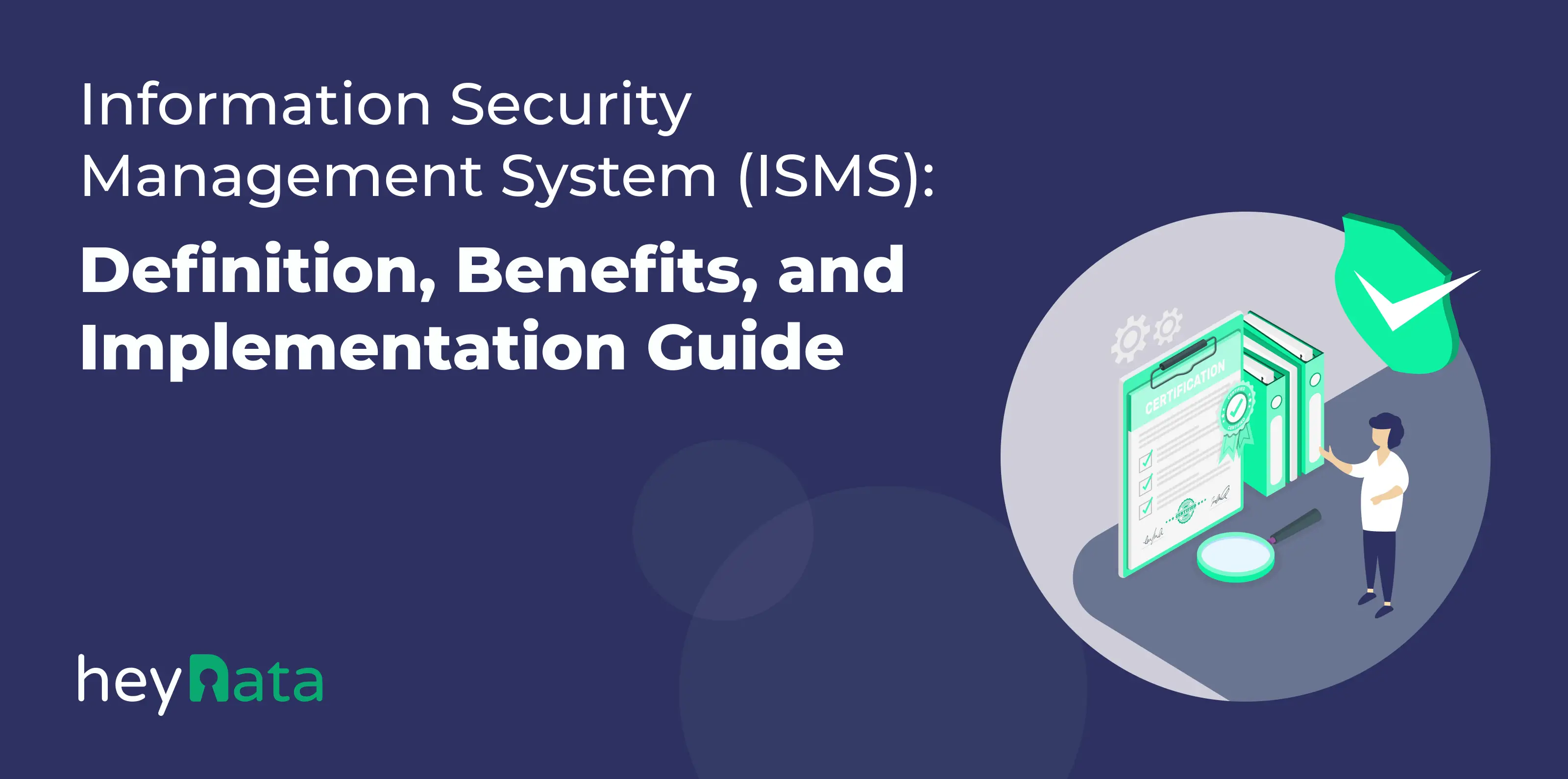
Simplify Your ISO 27001 Journey

Information Security Management System (ISMS): Definition, Benefits, and Implementation Guide
An Information Security Management System (ISMS) is a systematic approach designed to manage sensitive information securely. It encompasses the policies, procedures, and controls an organization implements to protect its data assets. An ISMS focuses on ensuring that information remains confidential, maintains integrity, and is available when needed, commonly referred to as the CIA triad. Key components include policies that define the organization's approach to managing information security, procedures that detail actions taken to achieve policy goals, and controls that serve as mechanisms to mitigate risks associated with information security.
Implementing an ISMS aligns with standards such as ISO 27001, which provides guidelines for establishing, implementing, maintaining, and continually improving an ISMS. Regular ISMS audits help organizations assess compliance and identify areas for improvement. By adopting a structured approach through ISMS, organizations can effectively safeguard their sensitive information and manage risks associated with data breaches. Through these comprehensive measures, organizations can maintain robust information security practices while adapting to evolving threats and regulatory requirements.
Related blog: ISO 27001: The Ultimate Guide to Compliance and Certification
Table of Contents:
Why do businesses need ISMS?
In today's rapidly evolving digital landscape, businesses face unprecedented challenges in protecting their sensitive information and maintaining regulatory compliance. The increasing sophistication of cyber threats, coupled with stringent data protection regulations, has made Information Security Management Systems (ISMS) an essential component of modern business operations. Recent studies indicate a significant rise in organizational breaches, highlighting the critical need for robust security measures that an effective ISMS can provide.
An Information Security Management System (ISMS) addresses these challenges by establishing comprehensive frameworks for security and compliance. Through clear policies and procedures, it help organizations meet regulatory requirements like GDPR and PCI DSS while demonstrating their commitment to data protection. The system takes a proactive approach to risk management, implementing regular assessments and audits to identify potential vulnerabilities before they can be exploited. Additionally, for organizations pursuing ISO 27001 certification, an ISMS provides the necessary structure and documentation to achieve and maintain compliance with international standards.
How does ISMS work?
Implementing an effective Information Security Management System (ISMS) requires careful planning and execution through several essential steps. Here's a detailed breakdown of the implementation process:
1. Setting Objectives
Organizations must define clear ISMS goals that align with their overall business strategy while considering their size and complexity. Setting realistic budgets and resource allocations during this phase is essential for successful implementation.
2. Defining the Scope of ISMS Implementation
Organizations must carefully evaluate their business and industry requirements along with regulatory compliance needs. This involves conducting detailed assessments of risk ratings for various systems, identifying priority information systems, and performing security-focused risk assessments. The scope definition helps establish clear boundaries for the ISMS implementation.
3. Asset Evaluation
Organizations need to conduct comprehensive risk assessments covering all key assets, including hardware like storage devices, computers, and phones, as well as software systems, physical and virtual servers, and cloud services. Special attention must be given to sensitive customer information (PII). This phase also includes creating risk management plans and maintaining an updated asset inventory.
4. Integration and Implementation
Integration and implementation involve deploying the Plan-Do-Check-Act (PDCA) cycle. This systematic approach includes planning objectives and processes, executing these planned processes, monitoring and measuring results, and implementing necessary improvements. Organizations must address various implementation challenges while ensuring effective communication with all stakeholders throughout this phase.
5. Certification
For organizations seeking formal recognition, certification is an optional final step. This typically involves undergoing a formal ISO/IEC 27001 audit through a two-step review process, resulting in a three-year certification. The benefits of certification include international recognition, enhanced business opportunities, and improved relationships with partners and stakeholders.
The success of ISMS implementation relies heavily on continuous monitoring, regular updates, and the ability to adapt to emerging security threats while maintaining alignment with organizational goals. This ongoing commitment ensures the ISMS remains effective and relevant in protecting the organization's information assets.

Simplify Your ISO 27001 Journey
Benefits of ISMS
Implementing an Information Security Management System (ISMS) offers numerous advantages that enhance organizational resilience. Key benefits include:
1. Proactively address data protection and cybersecurity
In today's information economy, many of your most critical assets are in digital form. With cybersecurity risks constantly making headlines and over 700 million records breached in the US alone during January and February 2024, while the EU reported over 300,000 data breach notifications since GDPR implementation in 2018, protecting valuable and vulnerable data is crucial.
The landscape is particularly challenging in the EU, where stringent data protection regulations and cross-border data transfers add complexity to security requirements. An ISMS offers a strong, proactive approach to protect data and intellectual capital while avoiding financial and reputational damages associated with breaches, especially important in the EU where GDPR fines can reach up to €20 million or 4% of global annual turnover.
Related blog: How to avoid expensive data breaches: Data security for SMEs
2. Meet legal and contractual requirements
An ISO 27001-aligned ISMS helps identify and address relevant stakeholder requirements, including crucial legal and contractual obligations such as:
- The EU GDPR (General Data Protection Regulation)
- The CPRA (California Privacy Rights Act)
- The PCI DSS (Payment Card Industry Data Security Standard)
The structured approach ensures these requirements are considered as part of security objectives and adequately addressed.
3. Qualify for new business opportunities
ISO 27001 certification provides clear proof of an effective ISMS and commitment to data protection. This certification can be particularly valuable as:
- It demonstrates a serious commitment to cybersecurity to customers and partners
- It may be required for government contracts and partnerships with larger institutions
- It provides a competitive edge in the marketplace
4. Improved business continuity planning and response strategies
With a well-defined ISMS, businesses can establish comprehensive plans for incident response and recovery. This proactive approach enables organizations to maintain operations during disruptions, ensuring that services remain available to clients and stakeholders.
5. Cost reduction through effective risk management practices
An ISMS facilitates the identification and mitigation of potential threats before they escalate into costly incidents. By investing in preventative measures and streamlining security processes, organizations can reduce financial losses associated with data breaches and regulatory fines.
These benefits underscore the importance of an ISMS in promoting not just security, but also operational efficiency and cost-effectiveness. Establishing a strong foundation in information security is essential for any organization aiming to thrive in today's digital landscape.
Your Journey to Compliance
heyData empowers SMEs in their compliance journey by providing expert guidance and comprehensive support throughout the process. Our platform simplifies the documentation process, provides templates for security policies, and offers continuous support for maintaining compliance. With our expertise in data protection regulations and security frameworks, we ensure your business compliance aligns with industry standards while meeting specific organizational needs.
Conclusion
Implementing an Information Security Management System is a crucial step toward safeguarding your organization's valuable information assets in today's digital landscape. ISMS offers a complete framework that adapts to new threats, covering everything from setting clear policies to implementing strong security measures.
To learn more about implementing these security measures effectively, be sure to read our next blog post on "ISMS Best Practices Framework and Implementation Guide," where we'll dive deeper into practical steps and strategies for successful ISMS deployment.
Important: The content of this article is for informational purposes only and does not constitute legal advice. The information provided here is no substitute for personalized legal advice from a data protection officer or an attorney. We do not guarantee that the information provided is up to date, complete, or accurate. Any actions taken on the basis of the information contained in this article are at your own risk. We recommend that you always consult a data protection officer or an attorney with any legal questions or problems.


